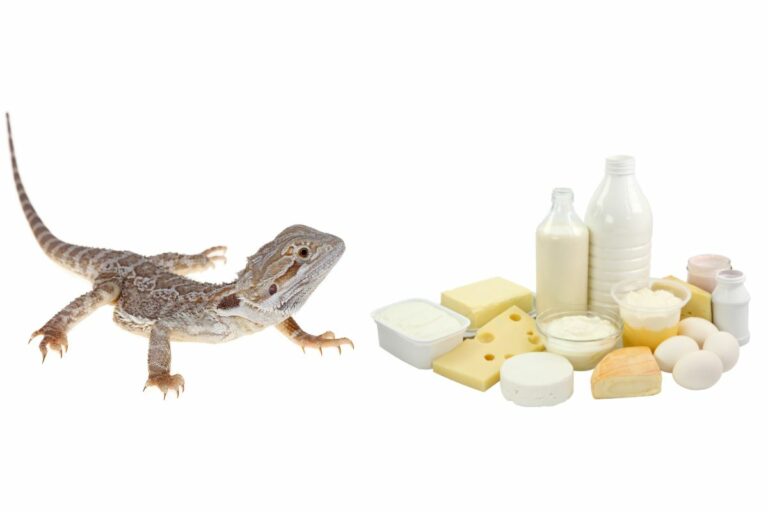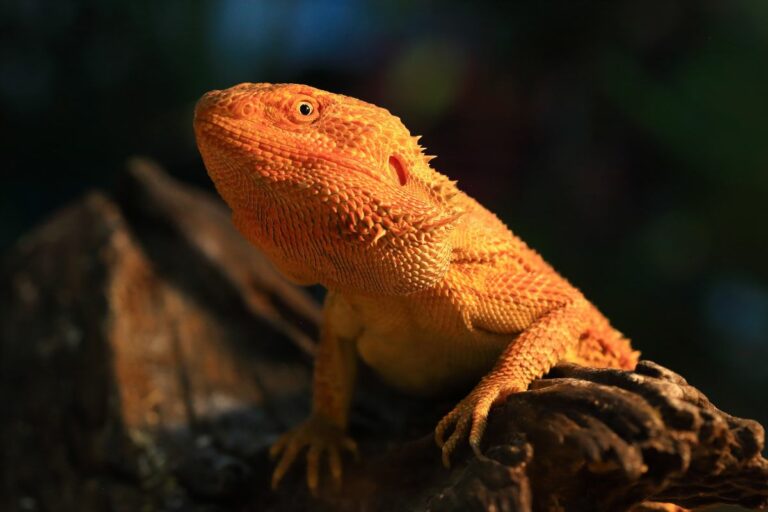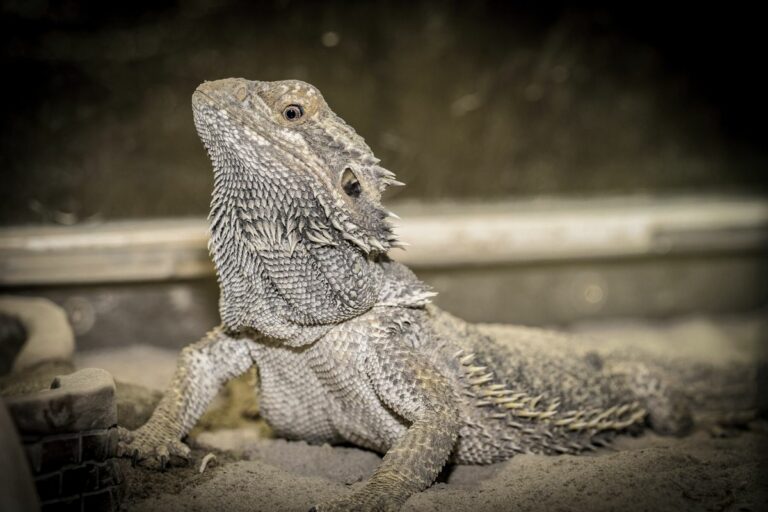Can Bearded Dragons Drink Tap Water? Pros, Cons, and Risks
Bearded dragons, like all living creatures, require proper hydration for their overall health and well-being. While they primarily obtain water through their diet, they still need access to a water source for drinking.
While tap water is a common choice for many reptile owners, the question arises: can bearded dragons drink tap water?
Bearded dragons can drink tap water. To make it safer for them, it’s best to use a water conditioner that removes chlorine, chloramines, and heavy metals. Another method is to let the tap water sit for 24 hours to allow any dissolved gases to dissipate.
Keep reading to learn more about how to make tap water safe for your bearded dragon and what other kinds of water bearded dragons can drink.
Can Bearded Dragons Drink Tap Water?

When it comes to the well-being of our beloved bearded dragons, providing proper hydration is of utmost importance. Just like any living creature, these fascinating reptiles rely on water to stay healthy and thrive in their environments. However, many bearded dragon owners wonder whether tap water is safe for them.
Generally, tap water can be safe for bearded dragons to drink. However, it often contains chemicals such as chlorine and chloramines that are added to disinfect the water supply. These chemicals can be harmful to reptiles when ingested in large quantities.
Therefore, it is crucial to treat tap water before offering it to your bearded dragon.
How to Make Tap Water Safe for Bearded Dragons?
To make tap water safe for bearded dragons, you can use water conditioners specifically designed for reptiles, which you can get on Amazon from the link or the image below;

These conditioners neutralize chlorine and chloramines, making the water safe for consumption. It’s important to follow the instructions on the conditioner to ensure proper dosage.
Another option is to let tap water sit for 24 hours, allowing the chemicals to dissipate naturally. However, this method does not remove heavy metals present in tap water, so a water conditioner is still recommended.
What Kind of Water Can Bearded Dragons Drink?
By understanding the kind of water these magnificent creatures can drink, we can ensure their health, happiness, and overall well-being.
So, let’s take a closer look at the different kinds of water bearded dragons can drink to make the best choices for our scaly companions. You can also take a look at my article on whether bearded dragons can drink Gatorade for a closer look at other kinds of liquids they can drink.
Can Bearded Dragons Drink Cold Water?
Bearded dragons are ectothermic animals, which means they rely on external sources to regulate their body temperature.
While they can drink cold water, providing them with room temperature or slightly warm water is generally recommended. That is because cold water may lower their body temperature, potentially impacting their digestion and overall well-being.
Offering water at a comfortable temperature ensures that they can drink it without any adverse effects.
Can Bearded Dragons Drink Filtered Water?
Bearded dragons can drink filtered water, as long as the filtration system effectively removes impurities and harmful substances.
It is important to choose a filtration system that is specifically designed to remove contaminants such as chlorine, chloramines, heavy metals, and other impurities that may be present in tap water.
Additionally, make sure to regularly maintain and replace the filters according to the manufacturer’s instructions to ensure the water remains clean and safe for your bearded dragon to drink.
Can Bearded Dragons Drink Bottled Water?
Bearded dragons can drink bottled water, as long as it is plain, still water without any additives, flavors, or carbonation.
It is important to choose a brand that provides natural, spring, or purified water without any additional minerals or chemicals that could be harmful to your bearded dragon’s health. So, make sure to always check the label to ensure that the bottled water is safe for consumption and meets the specific requirements for reptiles.
Can Bearded Dragons Drink Distilled Water?
It is not recommended to give bearded dragons distilled water as their primary source of hydration.
Distilled water lacks essential minerals that bearded dragons need for their overall health and well-being. These minerals play a vital role in maintaining their bodily functions and proper electrolyte balance.
While occasional consumption of distilled water may not be harmful, offering it as the sole source of hydration can lead to mineral deficiencies and imbalances in bearded dragons. It is best to provide them with water that contains the necessary minerals for their overall health, such as tap water treated with a water conditioner, filtered water, or bottled water without additives.
Can Bearded Dragons Drink Well Water?
Bearded dragons can potentially drink well water, but it is crucial to ensure the water is safe for their consumption.
Well, water quality can vary depending on various factors, including location and the condition of the well. So, before offering good water to your bearded dragon, it is strongly recommended to have the water tested by a professional laboratory or a reputable testing service.
The water test should cover parameters such as pH, mineral content, heavy metals, and any potential contaminants that may be present in the well water.
How Much Water Do Bearded Dragons Need to Drink?
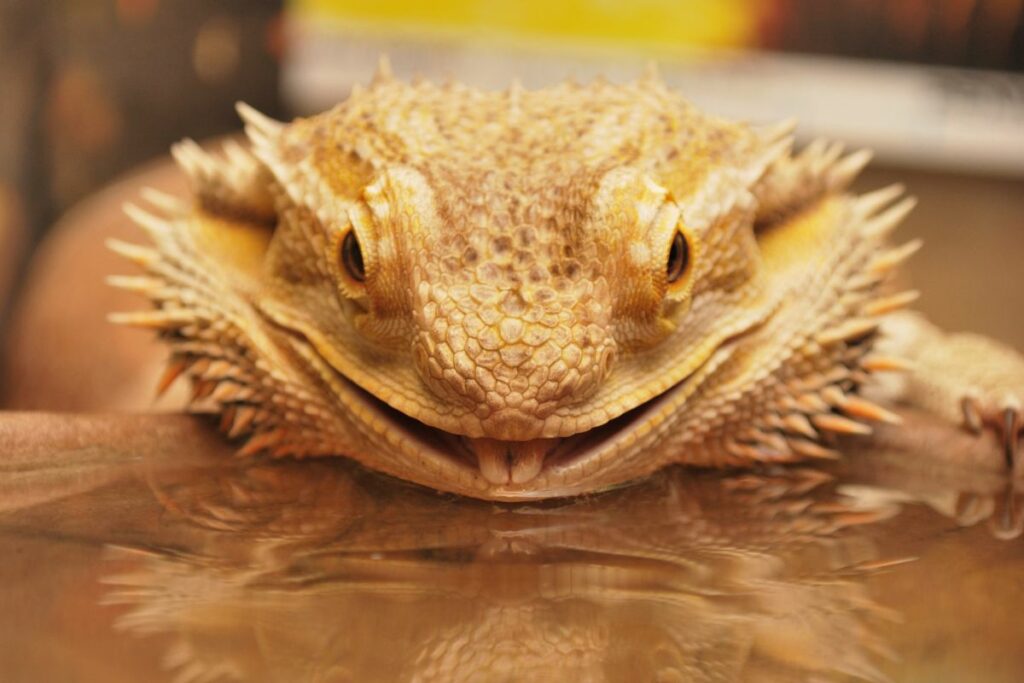
The water intake of bearded dragons can vary depending on various factors, including their size, age, diet, activity level, and environmental conditions. However, it is important to ensure that they have access to clean water at all times.
On average, adult bearded dragons may drink anywhere from a few milliliters to several ounces of water per day.
However, juvenile bearded dragons or those in high activity or shedding periods may have a higher water intake, so it’s essential to monitor your individual bearded dragon’s behavior and hydration levels to ensure they are adequately hydrated.
Bearded dragons also obtain water from their food, particularly from fresh vegetables, fruits, and even live insects that have high moisture content. Providing a balanced diet with hydrating food items can contribute to their overall water intake.
How to Tell That Your Bearded Dragon Is Dehydrated?
Detecting dehydration in bearded dragons is crucial for their well-being. Here are some signs to look for:
- Skin Condition: Dehydration can cause the skin to appear wrinkled or folded, especially around the back and sides of the body. The skin may also lose elasticity and appear dry.
- Sunken Eyes: Dehydrated bearded dragons may have sunken or dull-looking eyes. Healthy bearded dragons typically have bright and alert eyes.
- Lethargy: Dehydration can lead to lethargy or a lack of energy. If your bearded dragon is unusually inactive or sluggish, it could be a sign of dehydration.
- Decreased Appetite: Bearded dragons that are dehydrated may show a reduced interest in food or have difficulty eating. They may also exhibit weight loss.
- Dark Urine: Dehydrated bearded dragons may produce dark or concentrated urine. Monitor the color and frequency of their urine to detect any changes.
- Dry Mouth: Check for signs of a dry mouth, such as a sticky or tacky feel to the gums or tongue. Be cautious when observing their mouth to avoid getting bitten.
If you suspect that your bearded dragon is dehydrated, it is essential to take immediate action by providing access to fresh water and monitoring its drinking behavior.
Additionally, consider misting their enclosure or offering a shallow water dish for them to soak in, as some bearded dragons prefer absorbing water through their skin.
If symptoms persist or worsen, consult a reptile veterinarian for further guidance and appropriate treatment. Remember, maintaining proper hydration is crucial for the overall health and well-being of your bearded dragon.
Tips to Keep Your Bearded Dragon Hydrated
To ensure that your bearded dragon stays properly hydrated, here are some tips to follow:
- Provide Fresh Water: Always have a clean water dish available in your bearded dragon’s enclosure. Change the water daily to maintain its freshness and cleanliness.
- Offer Water in Different Ways: Some bearded dragons prefer drinking from a water dish, while others may prefer soaking in shallow water or even getting water from misting. Provide multiple options and observe their preferences.
- Use a Water Sprayer/Mister: Mist the enclosure with water to create a humid environment. Bearded dragons may lick the water droplets off surfaces, which can contribute to their hydration.
- Incorporate Hydrating Foods: Offer fresh vegetables and fruits that have high water content, such as cucumber, melons, and leafy greens. These foods can contribute to their overall water intake.
- Soaking/Bathing: Regularly provide your bearded dragon with the opportunity to soak in lukewarm water. This allows them to absorb water through their vent and helps with hydration.
- Monitor Hydration Signs: Be vigilant for signs of dehydration, including wrinkled skin, sunken eyes, lethargy, decreased appetite, and dry mouth. If you notice any of these signs, take immediate action to address their hydration needs.
- Avoid Overheating: High temperatures can lead to dehydration. Ensure that your bearded dragon’s enclosure has proper heat gradients and a basking spot, and monitor temperature levels to prevent excessive heat and fluid loss.
Conclusion
In conclusion, providing proper hydration is essential for the health and well-being of bearded dragons. While tap water can be safe for them to drink, it should be treated with a water conditioner to remove harmful chemicals.
Filtered water and certain brands of bottled water can also be suitable options. However, it is important to avoid distilled water as it lacks essential minerals.
Prioritizing hydration alongside a balanced diet will contribute to the overall health and happiness of your bearded dragon. By understanding the various water sources available and taking necessary precautions, you can ensure your scaly companion stays properly hydrated.
I hope you found it helpful! If you did, please share it or pin it!

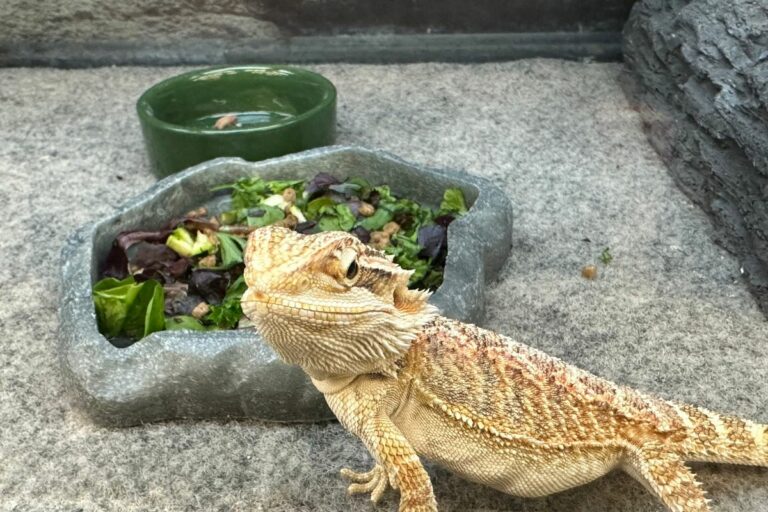
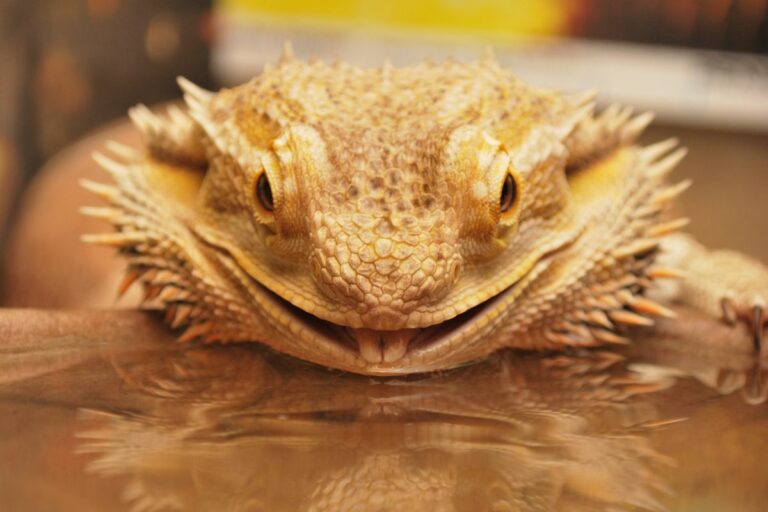
![Why is Your Bearded Dragon Turning Black & When [Actually] to Worry](https://knowreptiles.com/wp-content/uploads/2023/03/black-beardie--768x512.jpeg)
